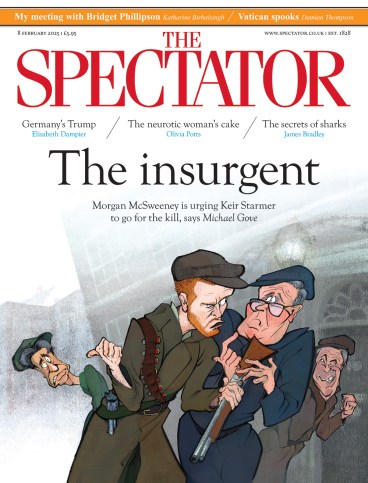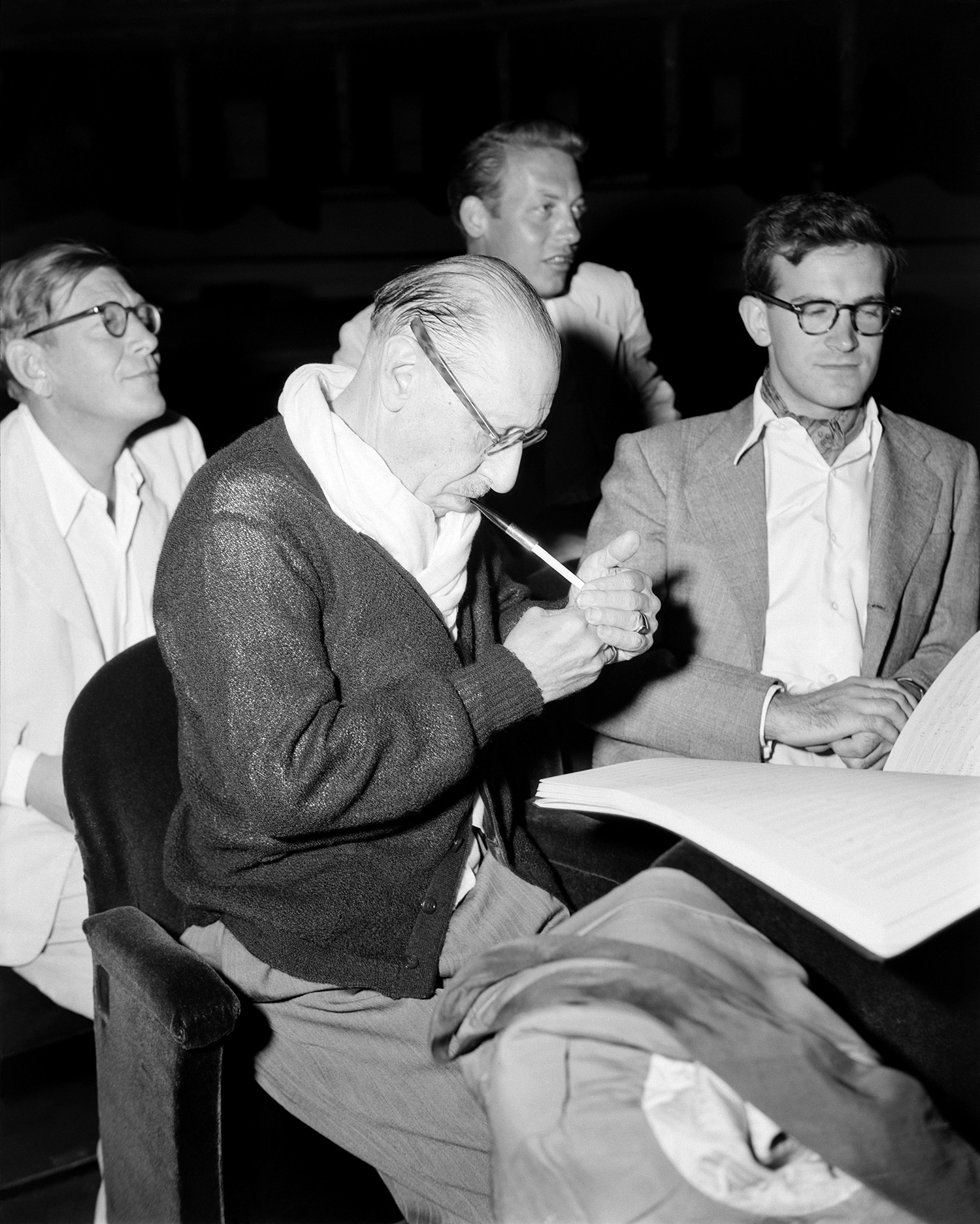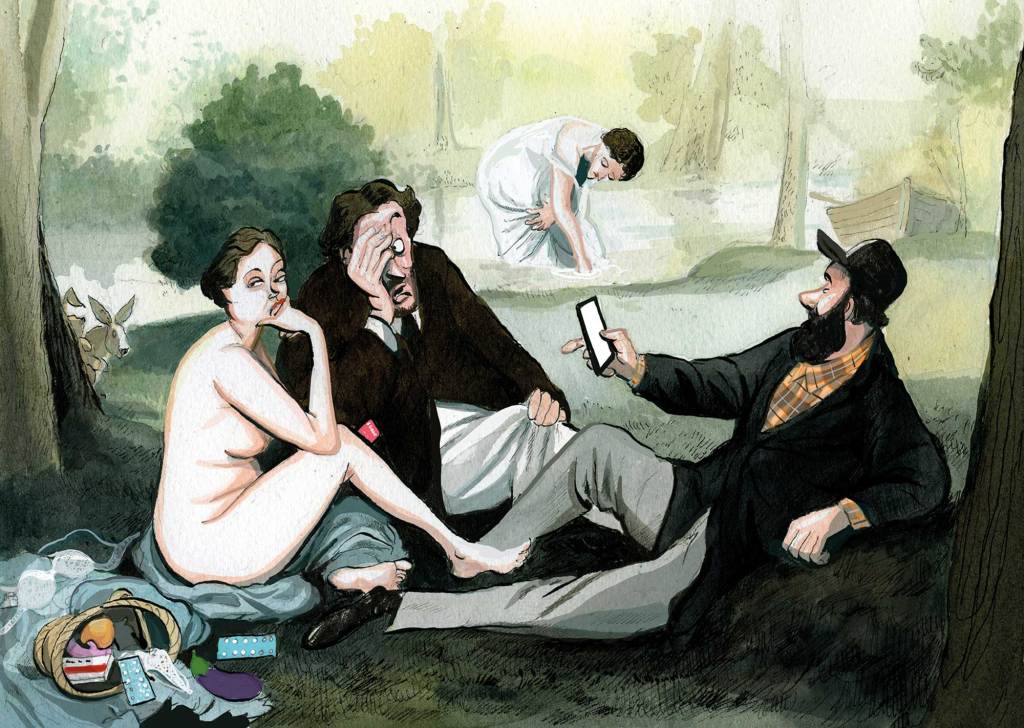
Next week, after the première of Mark-Anthony Turnage’s new opera Festen, the cast and conductor will take their bow. All being well, there’ll be applause; and then a brief lull as the creative team takes the stage. There’s often a ripple of curiosity in the audience at this point, because it’s rare that we get to see just how many people it really takes to make an opera. Standing near the composer will be Lee Hall, the writer of Billy Elliot and The Pitmen Painters, and now part of the most maligned – and indispensable – profession in all of music. He’s the librettist.
In short, Hall wrote the words, and in the world of opera there’s no more thankless task. ‘There’s this snobbery about it, an English snobbery, I suppose,’ he says. ‘There is this divide that I find – the theatre world is so separate from the music world in general. I go to concerts all the time and rarely see anybody from my world at them. It’s very odd.’
Hall’s feat (assuming he brings it off) is to square a near-impossible circle. Festen is adapted from Thomas Vinterberg’s cult 1998 movie, a product of the ultra-naturalistic Dogme 95 movement in which special effects, film scores and any kind of theatricality are all forbidden. Vinterberg said that his aim was ‘to counter the mediocrity and the conventional in the most conservative of our time’s artforms – namely filmmaking’. Unkind critics – and librettists are never short of those – might suggest that by turning Festen into an opera, Hall is pushing in the opposite direction.
‘I’ve never really shared the view that opera is conservative,’ he counters. ‘It’s always been about tackling big and difficult subject matter. The nature of opera is that it inhabits these huge emotions, and as a piece of dramaturgy the original film is wonderfully wrought. It’s in three acts, it observes all the dramatic unities, and so it felt to me a very easy lift from the film to the stage. And because it’s about a ritual, even though it’s a ritual that goes wrong, it seemed obvious to me that it could take a musical shape.’ For Hall, the restrictions of Dogme are no less artificial than opera’s own conventions.
The right librettist can liberate qualities that a composer never knew they possessed
‘You hide the artifice in order to have an immediacy. But it’s heightened, which obviously suits opera, because you can do things in music that you can’t possibly do in conventional drama. You can have more than one thing happening at the same time, and indeed it’s more exciting in music when you’re doing that. I was trying to provide prompts for Mark – to give Mark enough room to play. All art is artificial; I think we’ve tried to embrace the artificiality of it.’
He says ‘we’, and it’s clear that he’s enjoyed the partnership. But Hall knows – we all know – that if Festen is a success, it’ll be Turnage who gets the credit. If it flops, well, expect the libretto to cop the flak. Such is the looking-glass logic of classical music, even though outside the classical bubble Hall – whose credits include Shakespeare in Love and War Horse – is unquestionably the bigger name.
Yet the right librettist can liberate qualities that a composer never knew they possessed. Arrigo Boito captured enough of the essence of Shakespeare to tempt Verdi out of retirement: Otello and Falstaff are the result. Hugo von Hofmannsthal went further, creating wholly original plots and characters to fire Richard Strauss’s imagination – still a rarity in musical theatre, where adaptations are the norm. Hofmannsthal, unusually, succeeded in getting himself credited ahead of Strauss on the score of Der Rosenkavalier, a distinction promptly ignored by the music world. Writers are expected to stay in their lane.
Still, that’s always been the deal, and most librettists enter the process with their eyes open. Charles Hart – who wrote the lyrics for Phantom of the Opera, as well as (more recently) the libretto of Jonathan Dove’s comic opera Marx in London! – is pragmatic. ‘We’re like screenwriters. We’re low in the credits, but we’re crucial. The composer can’t start without us, but we don’t get much attention. We also acknowledge that it’s not our medium – it’s the composer’s, there’s no question of that. But if you can accept that, you’ll be a happy librettist and you will be an employed librettist.’
That’s not every writer’s idea of job satisfaction. Hart jokes that it’s a ‘good job for a university-educated dilettante’, though for every brilliant amateur like Mozart’s collaborator Lorenzo da Ponte, there are many who take their craft intensely seriously. It’s no coincidence that W.S. Gilbert is one of the few opera librettists (Broadway is a different story) whose name is linked inseparably with their composer. And there are even, occasionally, literary titans who master the very particular technical demands of lyric-writing (‘In singing, the vowel is everything, and the consonant is the enemy,’ notes Hart). W.H. Auden’s libretto for Stravinsky’s The Rake’s Progress has become a classic.
Still, why do it at all? What kind of artist is selfless enough to place their own imagination at the service of another? ‘We’re wordsmiths,’ says Hart. ‘It’s one of the reasons that many playwrights aren’t particularly drawn to writing opera libretti – because they aren’t in control. One of Britten’s librettists said that a libretto should be a letter to the composer saying, “This is how I think it should go.” And then the composer is off on a voyage of their own. They can be quite merciless about cutting and changing.’
For Hall, ‘perhaps it’s better that the composer takes charge of the thing. It’s hard to guess: there are so few chances to write new operas. Ultimately, I see everything that Mark has to do to make this opera – the orchestrations, the responsibility for really thinking it through – and what I’m doing is only this much, when he’s doing all that! I think what I’ve learned with Festen is the art of paring things back to allow the composer to fill them out. It was very much in my mind not to overwrite, not to put too many words in an aria. To boil it down: “No, get rid of that”, I realised. Anything I write that’s too baroque, too overcomplicated, really takes away from the space that Mark needs to work in.’
If one thing unites librettists it’s a profound respect for the musical side of the partnership. ‘Jonathan Dove will say to me, “This is the music I want to write for this scene”,’ says Hart. ‘Then it’s for me, the librettist, to furnish the words that will enable him to write the kind of music that he wants to write.’
That’s the librettist’s pay-off: a moment of creative communion in a profession – writing – that’s defined by solitude. And, above all, the understanding that two arts working together can say things that neither could express unaided. An experience for any artist to relish, even if your name is for ever destined to come second on the title page. ‘That’s where I probably sit,’ says Hall, as rehearsals for Festen enter the home straight. ‘It’s joyous being able to work with all these fantastic people; to hear people sing, and watch it all come together. I just feel I’m the luckiest person in London at the moment.’
Festen is at the Royal Opera House from 11–27 February.







Comments